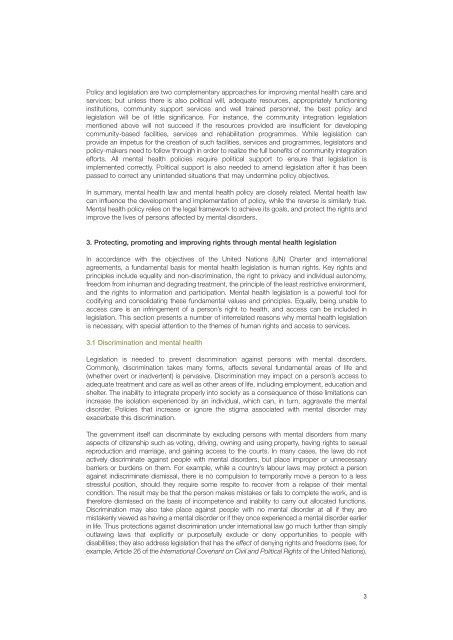human rights and legislation who resource book on mental health
human rights and legislation who resource book on mental health
human rights and legislation who resource book on mental health
Create successful ePaper yourself
Turn your PDF publications into a flip-book with our unique Google optimized e-Paper software.
Policy <str<strong>on</strong>g>and</str<strong>on</strong>g> <str<strong>on</strong>g>legislati<strong>on</strong></str<strong>on</strong>g> are two complementary approaches for improving <strong>mental</strong> <strong>health</strong> care <str<strong>on</strong>g>and</str<strong>on</strong>g><br />
services; but unless there is also political will, adequate <str<strong>on</strong>g>resource</str<strong>on</strong>g>s, appropriately functi<strong>on</strong>ing<br />
instituti<strong>on</strong>s, community support services <str<strong>on</strong>g>and</str<strong>on</strong>g> well trained pers<strong>on</strong>nel, the best policy <str<strong>on</strong>g>and</str<strong>on</strong>g><br />
<str<strong>on</strong>g>legislati<strong>on</strong></str<strong>on</strong>g> will be of little significance. For instance, the community integrati<strong>on</strong> <str<strong>on</strong>g>legislati<strong>on</strong></str<strong>on</strong>g><br />
menti<strong>on</strong>ed above will not succeed if the <str<strong>on</strong>g>resource</str<strong>on</strong>g>s provided are insufficient for developing<br />
community-based facilities, services <str<strong>on</strong>g>and</str<strong>on</strong>g> rehabilitati<strong>on</strong> programmes. While <str<strong>on</strong>g>legislati<strong>on</strong></str<strong>on</strong>g> can<br />
provide an impetus for the creati<strong>on</strong> of such facilities, services <str<strong>on</strong>g>and</str<strong>on</strong>g> programmes, legislators <str<strong>on</strong>g>and</str<strong>on</strong>g><br />
policy-makers need to follow through in order to realize the full benefits of community integrati<strong>on</strong><br />
efforts. All <strong>mental</strong> <strong>health</strong> policies require political support to ensure that <str<strong>on</strong>g>legislati<strong>on</strong></str<strong>on</strong>g> is<br />
implemented correctly. Political support is also needed to amend <str<strong>on</strong>g>legislati<strong>on</strong></str<strong>on</strong>g> after it has been<br />
passed to correct any unintended situati<strong>on</strong>s that may undermine policy objectives.<br />
In summary, <strong>mental</strong> <strong>health</strong> law <str<strong>on</strong>g>and</str<strong>on</strong>g> <strong>mental</strong> <strong>health</strong> policy are closely related. Mental <strong>health</strong> law<br />
can influence the development <str<strong>on</strong>g>and</str<strong>on</strong>g> implementati<strong>on</strong> of policy, while the reverse is similarly true.<br />
Mental <strong>health</strong> policy relies <strong>on</strong> the legal framework to achieve its goals, <str<strong>on</strong>g>and</str<strong>on</strong>g> protect the <str<strong>on</strong>g>rights</str<strong>on</strong>g> <str<strong>on</strong>g>and</str<strong>on</strong>g><br />
improve the lives of pers<strong>on</strong>s affected by <strong>mental</strong> disorders.<br />
3. Protecting, promoting <str<strong>on</strong>g>and</str<strong>on</strong>g> improving <str<strong>on</strong>g>rights</str<strong>on</strong>g> through <strong>mental</strong> <strong>health</strong> <str<strong>on</strong>g>legislati<strong>on</strong></str<strong>on</strong>g><br />
In accordance with the objectives of the United Nati<strong>on</strong>s (UN) Charter <str<strong>on</strong>g>and</str<strong>on</strong>g> internati<strong>on</strong>al<br />
agreements, a funda<strong>mental</strong> basis for <strong>mental</strong> <strong>health</strong> <str<strong>on</strong>g>legislati<strong>on</strong></str<strong>on</strong>g> is <str<strong>on</strong>g>human</str<strong>on</strong>g> <str<strong>on</strong>g>rights</str<strong>on</strong>g>. Key <str<strong>on</strong>g>rights</str<strong>on</strong>g> <str<strong>on</strong>g>and</str<strong>on</strong>g><br />
principles include equality <str<strong>on</strong>g>and</str<strong>on</strong>g> n<strong>on</strong>-discriminati<strong>on</strong>, the right to privacy <str<strong>on</strong>g>and</str<strong>on</strong>g> individual aut<strong>on</strong>omy,<br />
freedom from in<str<strong>on</strong>g>human</str<strong>on</strong>g> <str<strong>on</strong>g>and</str<strong>on</strong>g> degrading treatment, the principle of the least restrictive envir<strong>on</strong>ment,<br />
<str<strong>on</strong>g>and</str<strong>on</strong>g> the <str<strong>on</strong>g>rights</str<strong>on</strong>g> to informati<strong>on</strong> <str<strong>on</strong>g>and</str<strong>on</strong>g> participati<strong>on</strong>. Mental <strong>health</strong> <str<strong>on</strong>g>legislati<strong>on</strong></str<strong>on</strong>g> is a powerful tool for<br />
codifying <str<strong>on</strong>g>and</str<strong>on</strong>g> c<strong>on</strong>solidating these funda<strong>mental</strong> values <str<strong>on</strong>g>and</str<strong>on</strong>g> principles. Equally, being unable to<br />
access care is an infringement of a pers<strong>on</strong>’s right to <strong>health</strong>, <str<strong>on</strong>g>and</str<strong>on</strong>g> access can be included in<br />
<str<strong>on</strong>g>legislati<strong>on</strong></str<strong>on</strong>g>. This secti<strong>on</strong> presents a number of interrelated reas<strong>on</strong>s why <strong>mental</strong> <strong>health</strong> <str<strong>on</strong>g>legislati<strong>on</strong></str<strong>on</strong>g><br />
is necessary, with special attenti<strong>on</strong> to the themes of <str<strong>on</strong>g>human</str<strong>on</strong>g> <str<strong>on</strong>g>rights</str<strong>on</strong>g> <str<strong>on</strong>g>and</str<strong>on</strong>g> access to services.<br />
3.1 Discriminati<strong>on</strong> <str<strong>on</strong>g>and</str<strong>on</strong>g> <strong>mental</strong> <strong>health</strong><br />
Legislati<strong>on</strong> is needed to prevent discriminati<strong>on</strong> against pers<strong>on</strong>s with <strong>mental</strong> disorders.<br />
Comm<strong>on</strong>ly, discriminati<strong>on</strong> takes many forms, affects several funda<strong>mental</strong> areas of life <str<strong>on</strong>g>and</str<strong>on</strong>g><br />
(whether overt or inadvertent) is pervasive. Discriminati<strong>on</strong> may impact <strong>on</strong> a pers<strong>on</strong>’s access to<br />
adequate treatment <str<strong>on</strong>g>and</str<strong>on</strong>g> care as well as other areas of life, including employment, educati<strong>on</strong> <str<strong>on</strong>g>and</str<strong>on</strong>g><br />
shelter. The inability to integrate properly into society as a c<strong>on</strong>sequence of these limitati<strong>on</strong>s can<br />
increase the isolati<strong>on</strong> experienced by an individual, which can, in turn, aggravate the <strong>mental</strong><br />
disorder. Policies that increase or ignore the stigma associated with <strong>mental</strong> disorder may<br />
exacerbate this discriminati<strong>on</strong>.<br />
The government itself can discriminate by excluding pers<strong>on</strong>s with <strong>mental</strong> disorders from many<br />
aspects of citizenship such as voting, driving, owning <str<strong>on</strong>g>and</str<strong>on</strong>g> using property, having <str<strong>on</strong>g>rights</str<strong>on</strong>g> to sexual<br />
reproducti<strong>on</strong> <str<strong>on</strong>g>and</str<strong>on</strong>g> marriage, <str<strong>on</strong>g>and</str<strong>on</strong>g> gaining access to the courts. In many cases, the laws do not<br />
actively discriminate against people with <strong>mental</strong> disorders, but place improper or unnecessary<br />
barriers or burdens <strong>on</strong> them. For example, while a country’s labour laws may protect a pers<strong>on</strong><br />
against indiscriminate dismissal, there is no compulsi<strong>on</strong> to temporarily move a pers<strong>on</strong> to a less<br />
stressful positi<strong>on</strong>, should they require some respite to recover from a relapse of their <strong>mental</strong><br />
c<strong>on</strong>diti<strong>on</strong>. The result may be that the pers<strong>on</strong> makes mistakes or fails to complete the work, <str<strong>on</strong>g>and</str<strong>on</strong>g> is<br />
therefore dismissed <strong>on</strong> the basis of incompetence <str<strong>on</strong>g>and</str<strong>on</strong>g> inability to carry out allocated functi<strong>on</strong>s.<br />
Discriminati<strong>on</strong> may also take place against people with no <strong>mental</strong> disorder at all if they are<br />
mistakenly viewed as having a <strong>mental</strong> disorder or if they <strong>on</strong>ce experienced a <strong>mental</strong> disorder earlier<br />
in life. Thus protecti<strong>on</strong>s against discriminati<strong>on</strong> under internati<strong>on</strong>al law go much further than simply<br />
outlawing laws that explicitly or purposefully exclude or deny opportunities to people with<br />
disabilities; they also address <str<strong>on</strong>g>legislati<strong>on</strong></str<strong>on</strong>g> that has the effect of denying <str<strong>on</strong>g>rights</str<strong>on</strong>g> <str<strong>on</strong>g>and</str<strong>on</strong>g> freedoms (see, for<br />
example, Article 26 of the Internati<strong>on</strong>al Covenant <strong>on</strong> Civil <str<strong>on</strong>g>and</str<strong>on</strong>g> Political Rights of the United Nati<strong>on</strong>s).<br />
3

















